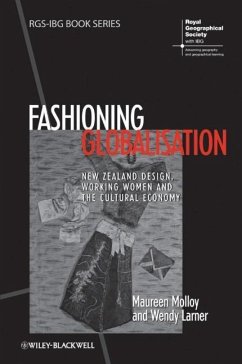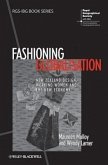Drastic changes in the career aspirations of women in the developed world have resulted in a new, globalised market for off-the-peg designer clothes created by independent artisans. This book reports on a phenomenon that seems to exemplify the twin imperatives of globalisation and female emancipation.
A major conceptual contribution to the literatures on globalisation, fashion and gender, analysing the ways in which women's entry into the labour force over the past thirty years in the developed world has underpinned new forms of aestheticised production and consumption as well as the growth of 'work-style' businesses
A vital contribution to the burgeoning literature on culture and creative industries which often ignores the significant roles taken by women as entrepreneurs and designers rather than mere consumers
Introduces fashion scholars and economic geographers to a paradigmatic example of the new designer fashion industries emerging in a range of countries not traditionally associated with fashion
Takes a fresh perspective on an industry in which Third World garment workers have been the subject of exhaustive analysis but first world women have been largely ignored
Hinweis: Dieser Artikel kann nur an eine deutsche Lieferadresse ausgeliefert werden.
A major conceptual contribution to the literatures on globalisation, fashion and gender, analysing the ways in which women's entry into the labour force over the past thirty years in the developed world has underpinned new forms of aestheticised production and consumption as well as the growth of 'work-style' businesses
A vital contribution to the burgeoning literature on culture and creative industries which often ignores the significant roles taken by women as entrepreneurs and designers rather than mere consumers
Introduces fashion scholars and economic geographers to a paradigmatic example of the new designer fashion industries emerging in a range of countries not traditionally associated with fashion
Takes a fresh perspective on an industry in which Third World garment workers have been the subject of exhaustive analysis but first world women have been largely ignored
Hinweis: Dieser Artikel kann nur an eine deutsche Lieferadresse ausgeliefert werden.
"Fashioning Globalisationprovides a comprehensive and fascinating view of an industry which provides new insights into the ways in which globalization proceeds and provides an alternative and authoritative account of the role of the fashion design industry in a globalising world." (New Zealand Geographer, 24 April 2015)
"This is a wonderful and timely contribution to fashionscholarship and to cultural geography and sociology. The authorsproduce a highly original and meticulously researched account ofthe entrepreneurial activities of women fashion designer in NewZealand while also raising many issues about work and employment inthis sector as a whole." -- Angela McRobbie,Professor of Communications, Goldsmiths, University of London,UK
"In this path breaking book, Molloy and Larner weave atheoretically sophisticated and empirically rich account of genderand globalisation that captures the diverse forms of embodiedsubjectivity and work that characterise the global fashionindustry. While previous studies of fashion emphasise first worldconsumers and third world workers, Molloy and Larner illustrate howglobalisation has impacted the lives of female fashion designers inNew Zealand, giving rise to new possibilities as well asconstraints. They present a fascinating account of how afemale-dominated creative industry gained a high profile withinneoliberal policy-making circles in New Zealand, a story thatilluminates the impossibility of separating the material and thesymbolic, economy and culture, and production and consumption in anunderstanding of globalisation." -- Deborah Leslie,Professor of Geography, University of Toronto, Canada
"This is a wonderful and timely contribution to fashionscholarship and to cultural geography and sociology. The authorsproduce a highly original and meticulously researched account ofthe entrepreneurial activities of women fashion designer in NewZealand while also raising many issues about work and employment inthis sector as a whole." -- Angela McRobbie,Professor of Communications, Goldsmiths, University of London,UK
"In this path breaking book, Molloy and Larner weave atheoretically sophisticated and empirically rich account of genderand globalisation that captures the diverse forms of embodiedsubjectivity and work that characterise the global fashionindustry. While previous studies of fashion emphasise first worldconsumers and third world workers, Molloy and Larner illustrate howglobalisation has impacted the lives of female fashion designers inNew Zealand, giving rise to new possibilities as well asconstraints. They present a fascinating account of how afemale-dominated creative industry gained a high profile withinneoliberal policy-making circles in New Zealand, a story thatilluminates the impossibility of separating the material and thesymbolic, economy and culture, and production and consumption in anunderstanding of globalisation." -- Deborah Leslie,Professor of Geography, University of Toronto, Canada








